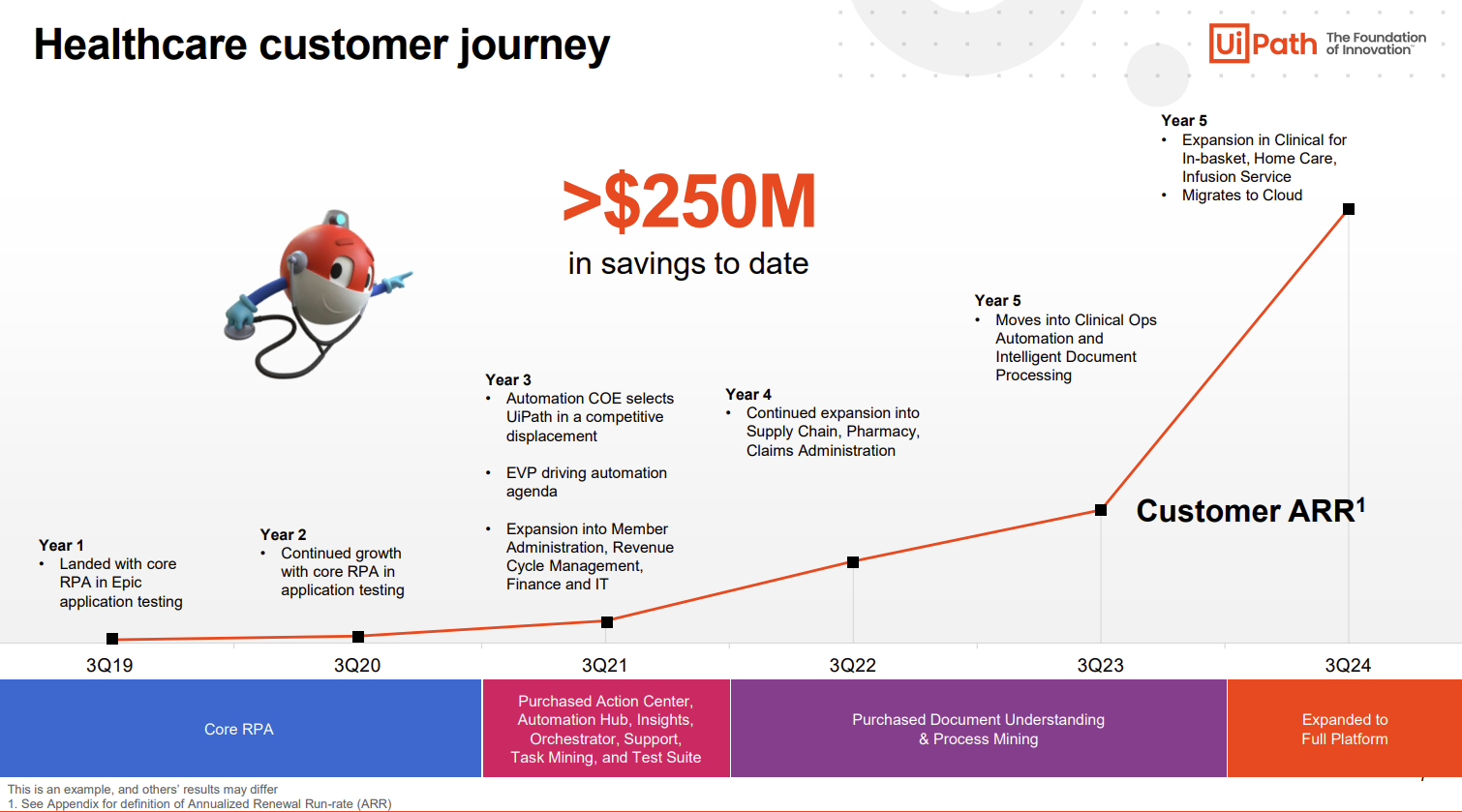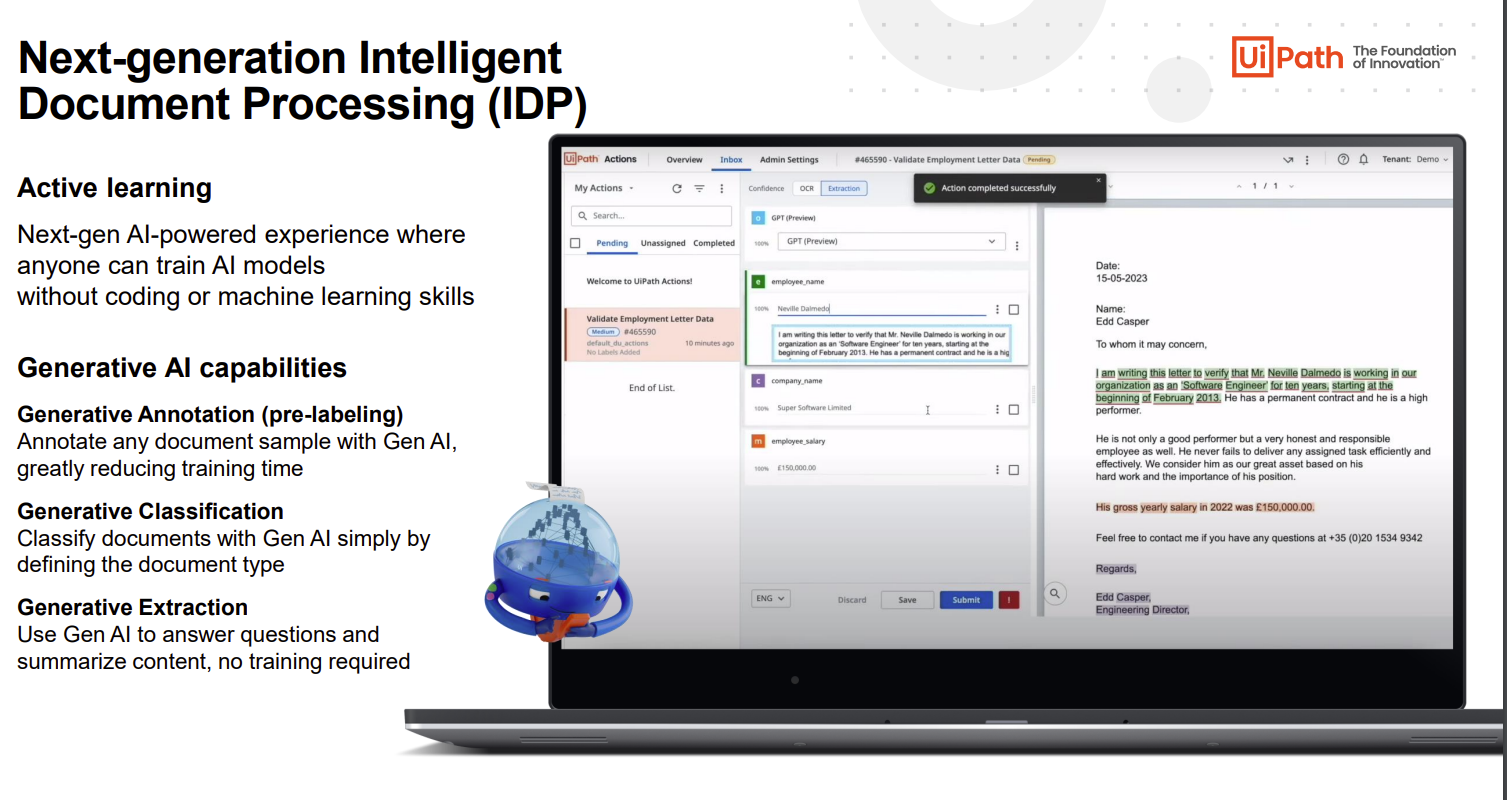UiPath's bets paying off: Here are the key Q3 takeaways
UiPath is gaining momentum as high profile partnerships, AI and automation and a focus on large enterprises and industries pay off.
The automation platform company reported better-than-expected third quarter sales of $326 million, up 24% from a year ago, and annual recurring revenue of $1.38 billion. UiPath reported a net loss in the third quarter of $31.54 million, or 6 cents a share. Non-GAAP earnings in the quarter were 12 cents a share.
For the fourth quarter, UiPath projected revenue between $381 million to $386 million.
Constellation Research analyst Holger Mueller said:
"UiPath is on strong growth trajectory, fueled by the need of enterprises to streamline processes. The current AI hype has helped UiPath further and that is slowly but steady growing its way to productivity."
Mueller added that if UiPath Co-CEOs Rob Enslin and Daniel Dines can continue growing revenue faster than costs they'll delight investors.
Indeed, UiPath closed a record number of third quarter deals over $1 million in ARR. Customers with $1 million or more in ARR grew 31% to 264, while customers with $100,000 or more in ARR increased to 1,974.
Here's a look at the key takeaways from UiPath's third quarter results.
UiPath landing more C-level conversations. Enslin, an SAP and Google Cloud alum, knows how to sell and he's revamped UiPath's sales approach to focus on value, platform plays and prioritizing "organizations that have a meaningful runway to invest in enterprise automation over the long-term." Partnerships with SAP and Deloitte are also putting UiPath on the CXO radar earlier in the budget cycle.
"Because we are having these conversations in the boardroom to the C-level suite, we are much earlier in the budget cycles than we previously been," said Enslin.
Simply put, much of UiPath's success can be attributed to a better go-to-market ground game. UiPath has a large enterprise installed base that started with robotics process automation (RPA) and is receptive to UiPath's automation platform and other tools such as document understanding, test suite and process mining.
UiPath adds AutoPilot generative AI to its automation platform: Here's what it means | Every vendor wants to be an automation platform | Constellation ShortListâ„¢ Robotic Process Automation
UiPath's SAP partnership showing early returns. The SAP-UiPath partnership is still young, but the combination has yielded some benefits. Notably, UiPath is involved in more transformation discussions with SAP and systems integrators. The primary use case highlighted is the automation of testing in big SAP environments.
SAP buys LeanIX, aims to couple it with Signavio, system transformation
Industry-focused use cases. UiPath is landing large healthcare and federal government deals. Enslin walked through multiple customer references--some named and others not. He cited a large non-profit US health system that has garnered more than $250 million in ROI since starting in 2018 with RPA. That health system is now using document understanding, process mining and centralized automation on UiPath.

UiPath's Enslin noted that UiPath has launched industry playbooks and 70 solution accelerators in its marketplace. Government customers cited were Veterans Affairs, Coast Guard, the IRS, Department of Homeland Security and US Department of Agriculture.
Document Understanding a focus area. UiPath's Document Understanding product line revolves around getting RPA to recognize documents, classify them and process them. The idea is Document Processing can automate paperwork tasks. UiPath has now launched Intelligent Document Processing (IDP), which is an AI-powered feature where generative AI can annotate documents, classify them and extract information to answer questions and summarize.
The term document understanding was mentioned 16 times during UiPath's third quarter earnings conference call. For context, RPA received 7 mentions and process mining had two. There's a reason Document Understanding is getting some play. Dines said:
"Our next-gen IDP permits almost anyone to train Specialized AI models for specific domains and document types, and our internal benchmarking shows that our next-gen IDP experience accelerates model training time by up to 80% from a week to a day for complex scenarios, or down to minutes for simpler forms."

AI and automation are connected and giving UiPath a boost. Enslin said CXOs realize that AI by itself won't generate the returns without automation. He added that in many cases, AI spending is going along with automation conversations.
He said:
"The AI communication that's happening in the market allows us to have meaningful conversations with customers and they see why the platform is relevant. Customers can really look at processes and tasks and understand how to drive value with the automation platform."
Dines added:
"AI plus automation is the thing that drives the biggest outcomes for our customers."
Related:

